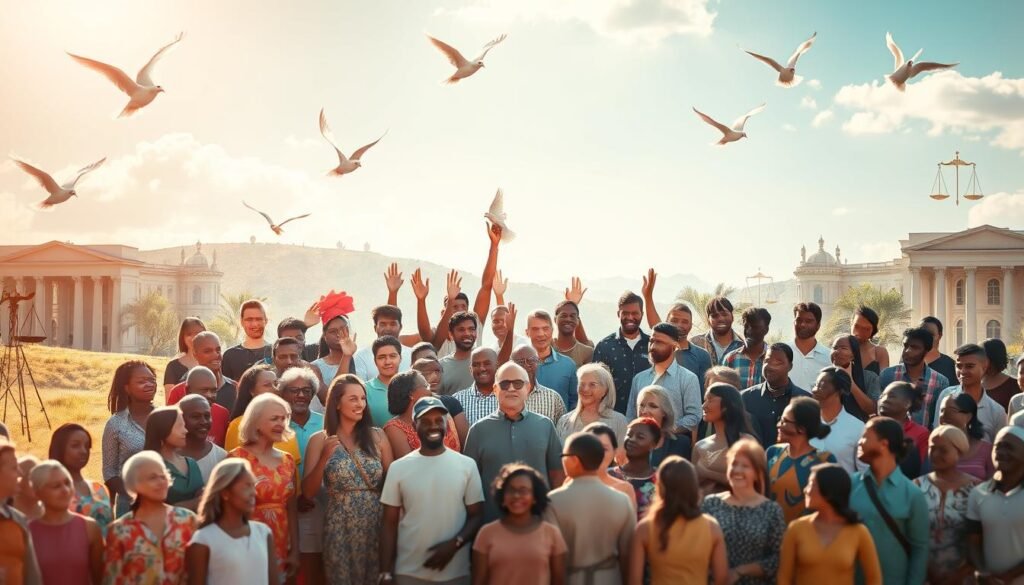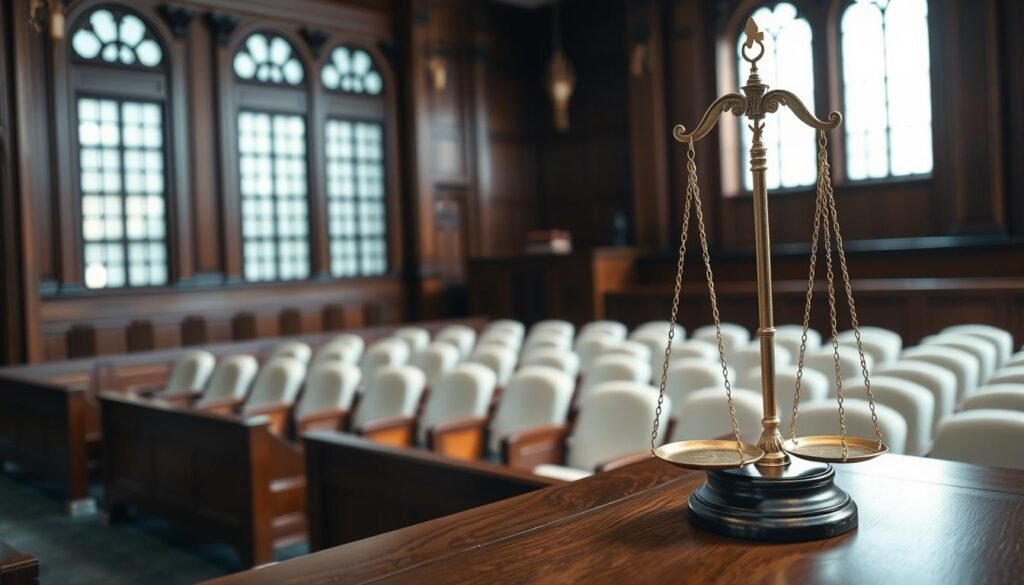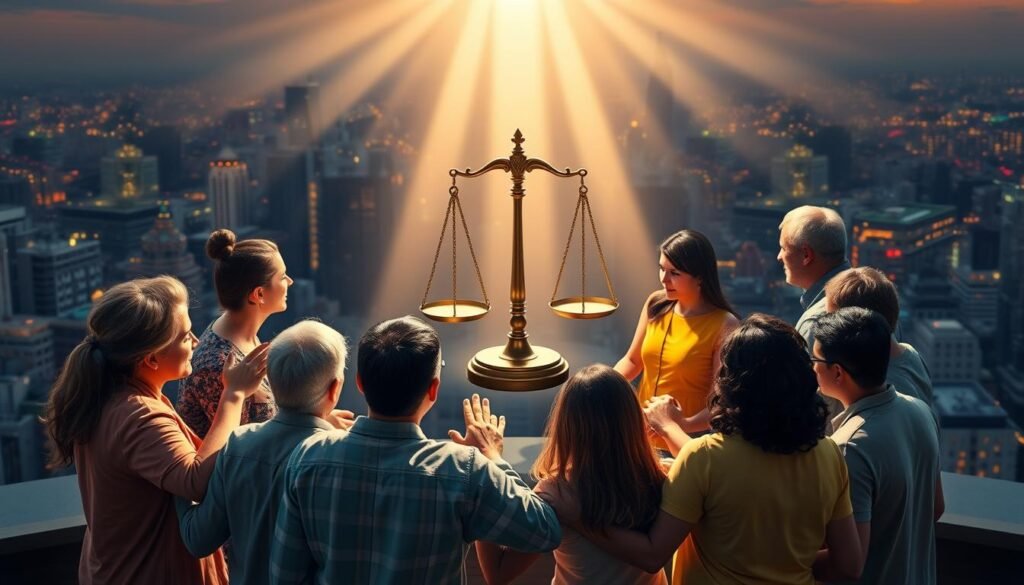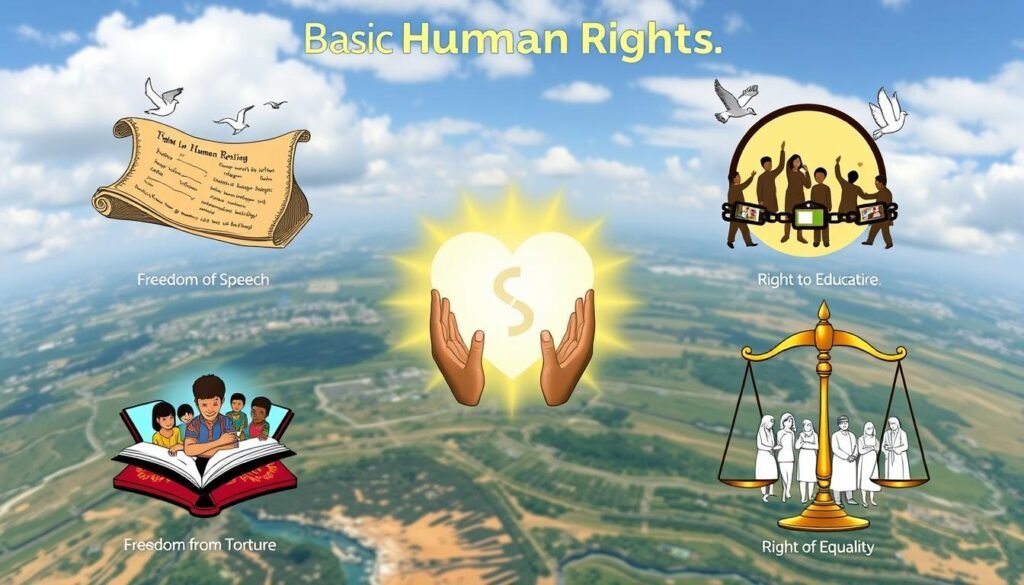Many of us wonder about the 5 basic human rights and their impact on our lives. These rights are key to ensuring dignity and equality for everyone. The idea of human rights has been around for centuries. But it wasn’t until 1948 that we saw a global effort to protect these rights with the Universal Declaration of Human Rights.
Understanding human rights is vital today. It helps us see the value of equality, justice, and freedom. The Universal Declaration of Human Rights states that all humans are born free and equal. This idea has been translated into over 500 languages, making it the most translated document worldwide.
When we talk about human rights, it’s important to think about the role of organizations like the United Nations. The Human Rights Council, set up in 2006, is key in promoting and protecting these rights worldwide. By learning about human rights and the efforts to protect them, we can see how important they are in our lives and others.

Table of Contents
ToggleThe latest Relaxing Tips straight to your inbox!
Join 30,000+ subscribers for exclusive access to our Relaxing tips!
Key Takeaways
- Human rights are fundamental to ensuring dignity and equality for all individuals.
- The Universal Declaration of Human Rights was adopted in 1948 and has been translated into over 500 languages.
- Understanding basic human rights is vital today, as it highlights the importance of equality, justice, and freedom.
- The concept of human rights is based on the idea that all humans are born free and equal in dignity and rights.
- Organizations like the United Nations are essential in promoting and protecting human rights globally.
Understanding the Foundation of Human Rights
Human rights are based on social justice and fundamental freedoms. The Universal Declaration of Human Rights, adopted in 1948, explains these rights. It has become a key part of international law, guiding many treaties and conventions.
At the core of human rights is the belief that everyone is born free and equal. Article 1 of the Universal Declaration of Human Rights says this. It’s the base for all other rights, key for social justice and dignity.
Some key points about human rights include:
- Universality: Human rights apply to everyone, no matter their nationality, race, or background.
- Indivisibility: All human rights are linked and depend on each other. Denying one right can harm others.
- Interdependence: Realizing one right often means realizing others too.
The Universal Declaration of Human Rights explains these principles and the rights we need for dignity. By understanding and promoting these rights, we aim for a fairer society. A place where everyone can enjoy their freedoms and live with dignity.
| Human Right | Description |
|---|---|
| Right to Life | The right to life is the most fundamental human right, essential for the enjoyment of all other rights. |
| Freedom from Discrimination | Freedom from discrimination is essential for promoting social justice and protecting human dignity. |
| Right to Education | The right to education is essential for promoting social mobility and economic development. |
The Right to Life and Personal Security
The right to life and personal security is a key human right. It’s found in the Universal Declaration of Human Rights and the International Covenant on Civil and Political Rights. This human rights definition is vital for keeping individuals’ dignity and well-being safe. It protects against life loss, torture, and cruel treatment.
The Universal Declaration of Human Rights says everyone has the right to life, liberty, and security. This fundamental rights helps bring about social justice and human dignity. Key parts of this right include:
- Protection against arbitrary deprivation of life
- Prohibition of torture and cruel, inhuman, or degrading treatment
- Right to liberty and security of person
It’s important to make these rights a reality. Governments and international groups must join forces to protect them. By doing so, we can build a fairer and more just society.
Freedom from Discrimination and Equality Before Law
We understand the value of universal human rights, like freedom from discrimination and equality before the law. This is key to guiding our actions. The International Covenant on Civil and Political Rights bans discrimination based on many factors.
In Australia, the Human Rights Act 2019 states everyone is equal before the law. The Anti-Discrimination Act 1991 defines what discrimination is. The Human Rights Act 2019 adds more to this list. For example, in 2009, a court in Victoria ruled an aged care facility couldn’t refuse people under 50.
Protected Categories Under Anti-Discrimination Laws
Anti-discrimination laws protect many groups, including race, color, and sex. The Australian Human Rights Commission checks if Australia follows these laws. The Universal Declaration of Human Rights, from 1948, is a big part of human rights.
Implementation in Different Societies
How these rights are followed varies across societies. Some places in Australia have their own Human Rights Acts, while others don’t. The Australian Human Rights Commission helps protect these rights in Australia. We believe in universal and fundamental human rights to fight discrimination and ensure equality.
What Are the 5 Basic Human Rights with Explanation: A Comprehensive Overview
The rights of every individual are key to human rights. These rights belong to all people, no matter their background. The Universal Declaration of Human Rights (UDHR) sets the standard for these rights.
The 5 basic human rights are about life, liberty, and safety. They also cover freedom from torture, slavery, and the right to think and speak freely. These human rights outlined in the UDHR are vital for everyone’s dignity and happiness.
Some important points about human rights are:
- Universal applicability: Human rights apply to all people worldwide without distinction.
- Indivisibility: All human rights are interconnected and interdependent.
- Inalienability: Human rights cannot be surrendered or taken away.

In conclusion, the rights of every individual are protected by international law. It’s important to support and respect these rights and freedoms for everyone’s dignity and well-being. The human rights outlined in the UDHR are a base for protecting and promoting human rights globally.
| Human Right | Description |
|---|---|
| Right to Life | The right to life, liberty, and security of person. |
| Freedom from Torture | The right to freedom from torture and cruel, inhuman, or degrading treatment. |
| Freedom from Slavery | The right to freedom from slavery and servitude. |
| Freedom of Thought | The right to freedom of thought, conscience, and religion. |
| Freedom of Opinion | The right to freedom of opinion and expression. |
Freedom of Thought, Conscience, and Expression
Human rights protect our freedom to think, believe, and speak. This right is key in a free and democratic society. It’s vital for people to think freely without fear of being punished or judged.
Here’s what a list of basic human rights might include:
- Freedom to think, believe, and change beliefs.
- The right to express opinions and information.
In summary, protecting our freedom to think and speak is critical. We must understand and defend these rights. This way, we can build a society where everyone can think and speak freely, without fear.
| International Instrument | Article | Provision |
|---|---|---|
| Universal Declaration of Human Rights | 18 | Freedom of thought, conscience, and religion |
| International Covenant on Civil and Political Rights | 18 | Freedom of thought, conscience, and religion |
| European Convention on Human Rights | 9 | Freedom of thought, conscience, and religion |
The Right to Fair Trial and Legal Protection
The right to a fair trial is key, found in the Universal Declaration of Human Rights and the International Covenant on Civil and Political Rights. It’s vital for fair treatment and protecting health and well-being. This right makes people feel safe and secure under the law, linking to relaxmymind.
Due process and protection against unfair detention are core to this right. They make sure people aren’t held without a fair trial. This way, they’re treated with respect and dignity in the legal process. The right to a fair trial is key for protecting individual rights and promoting health and well-being in society.
Some important parts of the right to a fair trial include:
- The presumption of innocence, which means people are seen as innocent until proven guilty
- The right to a fair and unbiased trial, ensuring fair treatment
- The right to legal representation, giving access to legal counsel for defense
Protecting the right to a fair trial helps promote relaxmymind and health in our communities. It ensures individuals are treated with dignity and respect. This is vital for building trust in the legal system and promoting social justice.

Social and Economic Rights in Modern Society
Social and economic rights are key in today’s world. They help ensure people’s well-being and dignity. The International Covenant on Economic, Social and Cultural Rights covers important rights like education, healthcare, and fair work. These are basic human rights.
The right to education is vital. It lets people learn and grow. Healthcare is also critical for keeping people healthy. Basic human rights like these are protected by law and help societies grow.
Labor rights and safe work conditions are also important. They help people do well at work. Here’s a look at some key labor rights:
| Right | Description |
|---|---|
| Right to Fair Wages | The right to receive fair and equal wages for work performed |
| Right to Safe Working Conditions | The right to work in a safe and healthy environment |
| Right to Social Security | The right to access social security benefits, such as unemployment benefits and pension plans |
In summary, social and economic rights are vital for people’s happiness and respect in today’s world. By protecting education, healthcare, and fair work, we support growth and ensure human rights and basic human rights are respected.
Implementation and Enforcement Mechanisms
The United Nations has set up ways to protect human rights. This includes the Human Rights Council and the Office of the High Commissioner for Human Rights. These groups are key in fighting for social justice and fundamental freedoms as stated in the universal declaration of human rights.
International bodies like the Human Rights Council meet often. They talk about countries’ human rights and offer advice. Also, national groups help protect rights at home.
Some important facts about human rights efforts are:
- 173 countries signed the International Covenant on Civil and Political Rights (ICCPR)
- More than 100 countries have their own human rights groups
- 50 UN member states have laws against discrimination and torture
These efforts show our dedication to social justice and fundamental freedoms from the universal declaration of human rights. Together, we can make sure everyone’s rights are respected.

| Human Rights Mechanism | Description |
|---|---|
| Human Rights Council | Hold regular sessions to discuss countries’ human rights situations and make recommendations |
| National Human Rights Institutions | Promote and protect human rights at the national level |
Challenges to Human Rights in the Digital Age
We face many challenges to universal human rights in the digital age. These include protecting privacy and freedom of speech online. The digital world has changed how we communicate and socialize. But, it also brings risks to our fundamental human rights.
It’s vital to understand the need to address these challenges. We must find ways to overcome them.
In the digital age, we need to balance individual rights with national security. The way we handle personal data affects our privacy. Surveillance by governments and companies is at new heights.
This impacts our freedom of speech and personal dignity. It also affects our autonomy.
Some challenges we face include:
- Bulk electronic surveillance of citizens by governments
- Requirements for Internet users to supply real names to service providers
- Instances of digital rights violations, such as death sentences imposed for social media posts
Protecting universal human rights in the digital age is key. We need a broad approach that considers individual rights, national security, and technology. By working together, we can make the digital age better for everyone.
The protection of human rights in the digital age is a collective responsibility. Governments, civil society, and individuals must all play a part. By focusing on human rights explanation and education, we can build a culture of respect and dignity online.
The Role of Civil Society in Protecting Human Rights
Civil society is key in fighting for human rights. Organizations like NGOs and human rights groups work hard. They do this at local, national, regional, and international levels.
Human rights in international treaties are vital for people’s well-being. These rights and freedoms make every person’s dignity and worth clear.
Here are some ways civil society helps protect human rights:
- Advocacy and lobbying for policy changes
- Providing direct services to victims of human rights violations
- Monitoring and reporting on human rights situations
- Raising awareness and mobilizing public support for human rights issues
Together, we can make sure human rights are respected. This ensures the rights and freedoms of every individual are protected.
| Organization | Role in Human Rights Protection |
|---|---|
| Amnesty International | Monitoring and reporting on human rights situations |
| International Committee of the Red Cross | Providing humanitarian assistance and promoting international humanitarian law |
Future Perspectives on Human Rights Protection
The importance of human rights is huge. The basic human rights list helps us understand and support these rights. Knowing about human rights is key to a fair society.
Protecting human rights in the future will need teamwork. Governments, civil groups, and people must work together. Education, awareness, and speaking out are important steps.
- Supporting organizations that work to promote and protect human rights
- Advocating for policies and laws that protect human rights
- Educating oneself and others about human rights and their importance
Together, we can make a future where everyone’s rights are respected. We must keep learning about and valuing human rights. As we go forward, we must remember the importance of human rights and strive for a world where everyone’s basic human rights are met.
| Year | Event | Impact on Human Rights |
|---|---|---|
| 1948 | Universal Declaration of Human Rights | Established a foundation for international human rights law |
| 1976 | UN International Covenant on Civil and Political Rights | Entered into force, providing a framework for protecting human rights |

Join 30,000+ subscribers for exclusive access to our Relaxing tips!
Conclusion
Human rights are key to a fair world. They are not just dreams but our duty to everyone. The Universal Declaration of Human Rights, adopted over 75 years ago, guides us towards a world where everyone is treated equally and with dignity.
Human rights are connected. Fulfilling one right often means realizing others. The declaration covers everything from the right to life to freedom of speech. It shows that every person deserves all human rights, equally.
We must work together to protect human rights. We need strong laws and ways to hold people accountable. By helping those who are vulnerable and letting everyone have a say, we can create a better future for all.
The path ahead is tough, but the benefits are huge. A world where human rights are respected is worth fighting for. By standing up for human rights, we make our communities better and help humanity as a whole.
FAQ
What are the 5 basic human rights?
The 5 basic human rights include the right to life and safety. They also include freedom from discrimination and equal treatment under the law. Other rights are freedom of thought and expression, the right to a fair trial, and social and economic rights like education and healthcare.
What is the definition of basic human rights?
Basic human rights are freedoms and entitlements for every person. They apply to everyone, no matter their background. These rights are essential and belong to all people.
What is the historical development of human rights?
Human rights have grown over centuries. Key moments include the Magna Carta in 1215 and the French Declaration in 1789. The Universal Declaration of Human Rights was adopted by the United Nations in 1948.
What is the significance of the Universal Declaration of Human Rights?
The Universal Declaration of Human Rights outlines basic rights for all people. It’s the base of the international human rights system. It has been adopted by many countries worldwide.
What is the right to life and personal security?
This right protects people from being killed or treated cruelly. It’s a key human right found in many laws and treaties.
What is the right to freedom from discrimination and equality before the law?
This right stops discrimination based on many factors. It ensures everyone is treated equally and has the same rights and opportunities.
What are the other 3 basic human rights?
The other 3 rights are: 1) Freedom of thought, conscience, and expression. This includes religious freedom and the right to speak and write freely. 2) The right to a fair trial and legal protection. This ensures fair treatment and protection from unfair detention. 3) Social and economic rights, like education, healthcare, and fair work conditions.
How are human rights implemented and enforced?
Human rights are enforced by international bodies and national systems. These include the United Nations Human Rights Council and national laws and courts. They work to check and address human rights issues.
What are the challenges to human rights in the digital age?
The digital age brings new challenges, like protecting privacy and free speech online. Governments and tech companies face the task of balancing security with human rights in the digital world.
What is the role of civil society in protecting human rights?
Civil society, like NGOs and human rights groups, is key in protecting rights. They monitor violations, push for policy changes, and rally public support for freedom.



Pingback: What Is Remission In Medical Terms?
Pingback: How To Calm My Mind From Overthinking?
Pingback: How Do You Calm Your Mind From Overthinking Quotes? Expert-B